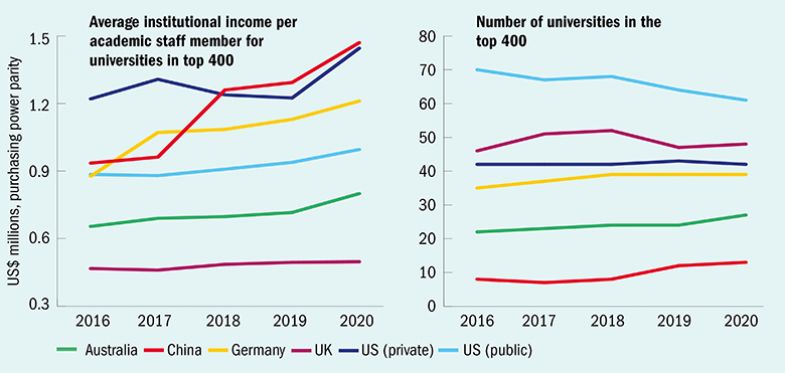Browse the full results of the World University Rankings 2020
UK universities have suffered declines in the latest Times Higher Education World University Rankings, as new data reveal that the funding gap between the UK sector and other major higher education systems is widening.
The University of Oxford tops the 2020 edition of the rankings for the fourth consecutive year, but most of the country’s other leading institutions have fallen.
The University of Cambridge, Imperial College London, UCL, the London School of Economics and Political Science, and the University of Edinburgh – the UK’s next highest-ranked universities – have all dropped by one place. Overall, 18 of the 28 UK institutions ranked in the top 200 of the table have declined since last year.
Japan also extends its lead over the UK in terms of overall representation from five to 10, after overtaking the UK as the second most-represented country in the world last year. The UK now has 100 ranked universities in total, while Japan has 110.
Top 10 universities
|
2020 rank |
2019 rank |
University |
Country |
|
1 |
1 |
United Kingdom |
|
|
2 |
5 |
United States |
|
|
3 |
2 |
United Kingdom |
|
|
4 |
3 |
United States |
|
|
5 |
4 |
United States |
|
|
6 |
7 |
United States |
|
|
7 |
6 |
United States |
|
|
8 |
8 |
United States |
|
|
9 |
10 |
University of Chicago |
United States |
|
10 |
9 |
United Kingdom |
While many UK institutions’ falls since last year are small, a THE analysis of five years’ of data reveals a consistent downward trend. In 2016, 34 UK universities featured in the top 200 (compared with 28 this year), of which 26 have since declined – largely due to universities in other countries improving at a faster rate.
In contrast, Germany managed to boost its numbers in the top 200 in the same period by three to 23, China by five to seven and Australia by three to 11.
The longitudinal study also shows that UK universities’ funding levels have been outpaced by other major higher education systems. The average amount of institutional income per academic at the 48 UK universities in the top 400 is $497,000 (£404,000), an increase of just 6.5 per cent since 2016.
The equivalent figure in Germany is $1.21 million, a rise of 38 per cent during the same period, while in China it is $1.47 million, an increase of 57.1 per cent. Even US public universities in the top 400 have fared better, with their average income rising 12.5 per cent to $995,000 – although the funding levels of state institutions in the top 200 dropped by 5 per cent.
Stephen Conway, director of research services at the University of Oxford, said that one of the major challenges facing his institution and other UK universities was “ensuring we have access to the resources and funding to continue to compete with our global peers”.
“The contribution that UK public funders make to the real costs of research in universities has declined at a time when other parts of the world are investing in their research and innovation systems,” he said.
Simon Marginson, director of Oxford’s Centre for Global Higher Education, said that UK universities had long benefited from having a strong academic culture and an entrepreneurial spirit, while “Britain’s global legacy and the confidence this brings when operating offshore” has also provided advantages.
However, he said that these conditions “cannot hold up the UK position forever in the face of the countervailing factors” of modest national investment on research and development; strong policy pushback against “global connections, which is affecting both practical global engagement and international reputation”; the weakened financial sustainability of universities as a result of the pensions dispute; and the loss of European structural funds and falling European research funding.
Territories represented in the top 200
|
Country/region |
Number of |
Best university |
Best rank |
|
United States |
60 |
2 |
|
|
United Kingdom |
28 |
1 |
|
|
Germany |
23 |
=32 |
|
|
Australia |
11 |
=32 |
|
|
Netherlands |
11 |
Wageningen University & Research |
59 |
|
Canada |
7 |
18 |
|
|
China |
7 |
23 |
|
|
Switzerland |
7 |
=13 |
|
|
South Korea |
6 |
64 |
|
|
France |
5 |
=45 |
|
|
Hong Kong |
5 |
35 |
|
|
Sweden |
5 |
41 |
Phil Baty, THE’s chief knowledge officer, said that, based on current trends and with Brexit looming, Germany was “poised to overtake the UK as Europe’s number one higher education nation”, thanks to its extra research spending, increased focus on internationalisation and successful excellence initiative.
Meanwhile, mainland China has continued its ascent of the rankings this year and is now home to the top two universities in Asia for the first time. Tsinghua University holds on to the number one spot in the region, despite dropping one place since last year to 23rd, while Peking University is now second in Asia and 24th overall, after rising seven places. The National University of Singapore drops two places to 25th.
Elsewhere in the top 200, the University of Science and Technology of China rises 13 places to joint 80th and Shanghai Jiao Tong University climbs 32 places to joint 157th.
China also strengthens its overall representation in the rankings, claiming 81 spots, nine more than last year. In general, the top institutions in mainland China have higher scores for citation impact and research income this year.
Average institutional incomes and ranking positions

Australia has also had a strong year, with two institutions – Queensland University of Technology and the University of Canberra – entering the global top 200 for the first time under the current (post-2011) methodology. Of the 35 Australian universities present in the ranking, 19 finish higher than last year, with only five declining.
On average, Australian universities improved on 12 of the 13 metrics underpinning the ranking over the past year, with PhDs awarded per staff (where its score was flat) the only exception. The higher ranking positions were largely driven by their improved citation impact scores, as well as strong scores for research environment and international outlook.
Conor King, executive director of Innovative Research Universities, a coalition of seven Australian institutions, said that Australian universities’ ability to consistently deliver high quality teaching and research over the past decade was responsible for their success.
“While the international market is increasingly competitive for Australian universities, it has pushed them even harder to make sure what they are offering is genuinely world class. There is no longer any room for complacency in global higher education,” he said.
The THE World University Rankings 2020 include almost 1,400 universities from 92 countries.
POSTSCRIPT:
Print headline: Falls for UK as Germany and Australia climb table
Register to continue
Why register?
- Registration is free and only takes a moment
- Once registered, you can read 3 articles a month
- Sign up for our newsletter
Subscribe
Or subscribe for unlimited access to:
- Unlimited access to news, views, insights & reviews
- Digital editions
- Digital access to THE’s university and college rankings analysis
Already registered or a current subscriber?







